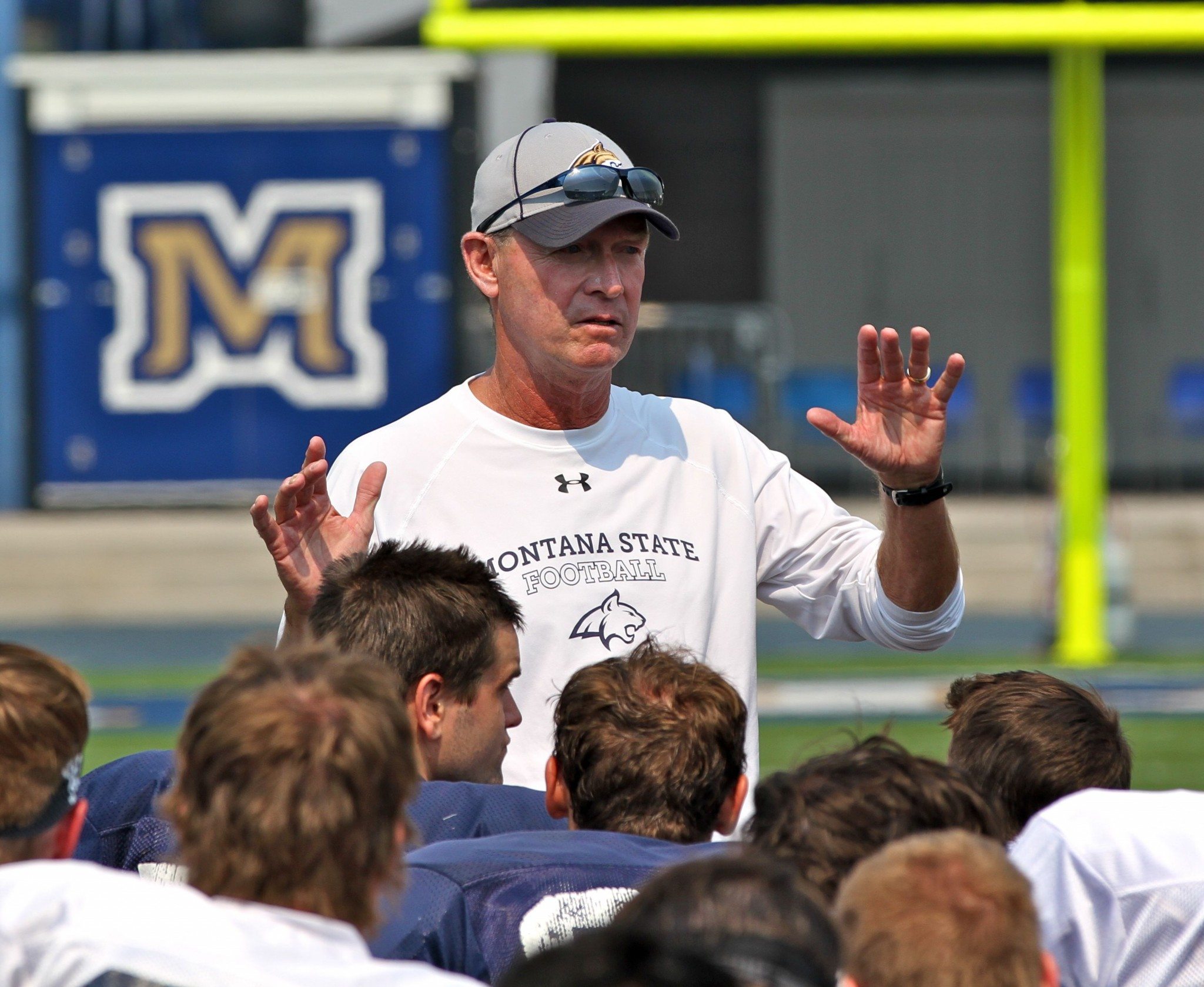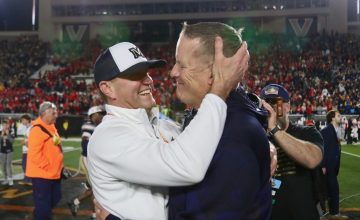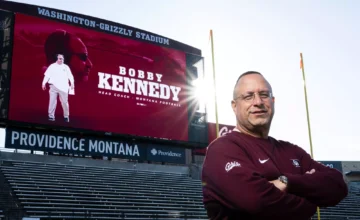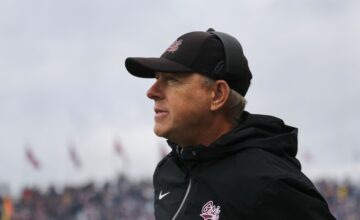The pressure of a paramount season seems to be staring Rob Ash directly in the face.
The ninth-year Montana State head football coach has been a head coach at the college level every season since 1980. His career has included just three stops —Division III Juniata for nine seasons and 18 seasons at Drake before coming to Montana State in 2007 — and he has never been let go or fired. The 64-year-old is the all-time leader in coaching wins at all three schools and he has eight conference titles on his resume.
At Montana State, Ash has led Montana State to 66 wins over the last eight seasons, including 46 in the Big Sky. Between 2010 and 2012, the Bobcats hung three straight Big Sky Conference banners by posting a 21-3 record against the rest of the league. But since the graduation of the most successful and decorated class in MSU history, Ash and his staff have been searching for the answers as they try to climb back atop the Big Sky Conference mountaintop.
Ash has won more games at Montana State than Sonny Holland or Jim Sweeney. His three straight titles were something not even Sonny Lubick, Dave Arnold or Mike Kramer could achieve. But Ash has endured consistent criticism throughout his last half-decade in Bozeman for his lack of ability to guide his team to wins in crucial moments.
Ash is one of the few coaches to post back-to-back wins at Washington-Grizzly Stadium over the Montana Grizzlies . MSU’s 2010 win kept Montana out of the playoffs for the first time since 1992. The ‘Cats’ 2012 win sealed UM’s first losing season since 1985.
But Ash has just two playoff wins among his 243 career victories. He is a combined 38-3 against Sacramento State, Weber State, Northern Colorado, Portland State, Idaho State, UC Davis, North Dakota and Southern Utah. Ash’s Bobcats are 7-17 against Cal Poly, Northern Arizona, Eastern Washington and Montana, including 4-13 against EWU and UM.
Ash begins his ninth Big Sky Conference campaign against Cal Poly at Bobcat Stadium on Saturday. The Bobcats are the preseason pick by the league’s coaches to win the conference. Montana State broke a school record for points in a season last fall. Most of the offense, including junior quarterback Dakota Prukop and a veteran offensive line, returns in tact.
The visibility of the program has never been higher and neither has the pressure.
“I don’t think anybody’s external expectations can be any higher than the ones we put on ourselves,” Ash said. “I want to win every single game I coach. One thing that is a very mistaken fact about me is that I’m more competitive than anybody knows. I don’t go out there and scream and yell and go on tirades but I am a super competitive person. I want to win. I want this program to be great and I want us to win championships. I love rings and I love banners. I want to win a national championship.
“We’ve had nine years to build this program. There’s really no excuses.”
To reach this pinnacle season, Ash has made a conscientious commitment to educating himself throughout his life. He has always had an affinity and fascination with the game of football. He’s also a bookworm who voraciously reads about history and leadership. Each day he sits in his office, he’s surrounded by influential writings ranging from John C. Maxwell’s literature on irrefutable laws of leadership to America Express CEO Harvey Bolub’s book on defining and polishing a brand to NBA Hall of Fame head coach Pat Riley’s writings on avoiding the disease of more.
Ash’s encyclopedic knowledge of football strategy and his ability to teach it in laymen’s terms is perhaps his greatest gift. His love and dedication for education has been always been a pillar of his life, something that was instilled in him from his youth.
David Ash was a preacher in Des Moines, Iowa when his wife, Martha, gave birth to their second child and first son, Robert W., on July 9 of 1951. Rob and his three siblings grew up in the church.
“That was our social life,” Ash said. “My parents, they didn’t drink or smoke or go out. We never went to any restaurants and ate. We didn’t have any money. Everything was at the church. I sang in the choir and went to Sunday school and went to church. Everything revolved around that and academics.”
Ash also remembers a commitment to athletics. His family saved up enough money to buy a few tennis rackets. He and his siblings would spend hours hitting balls on the local court.
Every August, David would take the family around the country on camping trips. Rob has been to all 50 states and almost every national park. He never remembers staying in a hotel or eating at a restaurant one time while on vacation, something he didn’t even notice until he became an adult.
“It was a good life,” Ash said. “There was a very solid family structure, morals, commitment to doing things right. We didn’t have a shower in my house all the way through high school. We had a bathtub. Four kids, one bathtub. I grew up with you taking a shower after practice at the school. You would take a bath on Saturday night for church on Sunday. It’s just the way it was. We didn’t have anything but we didn’t know we were poor. It didn’t bother us one bit.”
Rob’s dedication to academics and athletics helped him earn acceptance to Cornell College, a private, exclusive liberal arts school that today boasts 1,100 students but an endowment of $67 million.
At Cornell, Ash played quarterback under Jerry Clark, himself a man with an affinity for learning. Clark employed a pass-heavy offense during Ash’s first years at Cornell, a main reason Ash chose the school.
Partway through Ash’s career, Clark went to Houston to learn the “Houston Veer”, an innovative offense that helped Bill Yeoman’s Cougars capture four titles in the powerful Southwest Conference between 1976 and 1984. The split-back offense still lent itself to a drop back passing game. When Clark returned, he taught Ash the offense by having the two play checkers every day, Ash operating 11 offensive checkers and Clark operating 11 defensive checkers.
“I had to know everybody’s assignment on every play,” Ash said. “One of the reasons I coach is the chess match, the strategy part of the game has always fascinated me.”
In 1973, Ash graduated Phi Beta Kappa, earning an NCAA Top Five award and a post-graduate scholarship to the University of Michigan. The Top Five award, now known as the Top 10, is a prestigious NCAA award given to outstanding senior student-athletes. Notable recipients include John Elway, Steven Young and Peyton Manning.
After earning his master’s degree in history in Ann Arbor in 1975, Ash missed the competition and camaraderie of football. He returned to Cornell. During his time serving on Clark’s staff, Ash completed a second master’s degree in physical education through the University of Iowa. He also met Margaret, a Cornell alum who has been his wife since 1978. In 1980, Ash received his first shot. He’s been a head coach ever since.
At Juniata, he began with a veer and option offense. Joe Paterno was one of the hottest coaches in college football at Penn State in the 1980s. Ash was just up the road in the foothills of Pennsylvania. His strategies shifted more toward Penn State’s I-formation ways.
Philosophically, Ash pulled from various influences. He studied Lou Holtz during his Arkansas and Notre Dame days, taking his idea of positive thinking and a priority of caring for players. Ash studied Bill Curry, the Georgia Tech (1980-1986) and Alabama (1987-1989) head coach for his leadership philosophies.
By 1986, Drake has established a sterling academic reputation but five straight losing football seasons caused the school chose to not award athletic scholarships. In 1989, Ash was granted the opportunity to return to his hometown. In 18 seasons at Drake, Ash won 125 games, four conference titles and played a leading role in establishing the Pioneer Football League. He earned Pioneer Coach of the Year honors in 1995, 1998 and 2005.
At Drake, prominent football names like North Carolina State head coach Dave Doeren, Florida Atlantic head coach Charlie Partridge, Ohio State defensive coordinator Chris Ash (no relation) and Northern Illinois defensive coordinator Jay Niemann served as a Bulldog assistant coach.
“We were fortunate to have some really good years defensively with guys who came up through the system from players to coaches,” Niemann said. “Rob fostered an environment where he allowed me to do basically what I wanted to do defensively to have success and we were fortunate enough to have a high degree of success.”
But Drake had no ability to go to the playoffs or chase national championships. When things came to a head in Bozeman and Montana State needed an academically oriented coach, Ash seemed to be the perfect fit.
Ash’s reality and expectations have continued to grow since arriving in Bozeman. His basic tenants remain the same. He wants his players to concentrate on academics. He still believes being fundamentally sound is the most important part of football, outweighing strategy or effort. Ash believes that when you are playing another good team, “they will probably play hard,” therefore execution is key. His favorite sayings are “get a hat on a hat” and “defend every gap” or “be gap sound”.
“The quest for every play I’ve ever called, any play we’ve ever run with any of the teams I’ve coached over 40 years is to get the right guys blocked,” Ash said.
Although Ash is the head coach of a team that is averaging 570 yards and 47.5 points per game, he still believes defenses have the advantage. If the quarterback hands the ball off or throws it, the defense all of a sudden has an extra guy, Ash says.
The “volume of details” has been the biggest transition for Ash at MSU. From the community service requirements to the media obligations — Ash receives a $60,000 bonus for his media duties — to compliance to recruiting, the “ante has been upped”, he said. Ash can still remember when he had five coaches on the coaching staff and each one coached sports like wrestling, track, basketball, tennis and baseball once each football season ended.
“People have asked me over the years about going into administration and I actually was the interim athletic director at Drake for six months and that scared me because I was getting really far away from football,” Ash said. “I love the game.”
In recent years, Ash has risen to powerful positions. In 2009, Ash was named second vice president of the American Football Coaches Association. Per AFCA tradition, Ash moved up to first vice president in 2010 and became president in 2011.
“I’ll be honest, it’s always been like he’s as much or more of a political figure, one that organizes a team versus actual coaching the football, the Xs and Os,” MSU senior left tackle John Weidenaar said. “He’s like the president of the company.”
In 2010, Ash was named the Big Sky Conference Coach of the Year. In 2011 Ash earned his first playoff win, a 26-25 triumph over New Hampshire in the second round. MSU lost at home to Sam Houston State in the quarterfinals the next week. After the season, Ash was named the 2011 Liberty Mutual FCS Coach of the Year.
In 2012, after a 10-1 run through the regular-season capped by a win in Missoula, MSU beat Stony Brook in the second round of the playoffs before losing to Sam Houston again. Ash earned the AFCA Football Coaches Association Region VI Coach of the Year.
When Ash arrived at Montana State, the program was in shambles off the field. An assortment of off-field issues surfaced beginning in October 2004 when former assistant head coach Joe O’Brien was sentenced to four years in prison for his role in a methamphetamine distribution conspiracy. The issues culminated in the murder of a rival drug dealer by former MSU athletes John Lebrum (football) and Branden Miller (basketball).
All told, six former Bobcats were arrested and sentenced for drug or murder charges. The football program was on probation for academic progress rating violations. Despite winning three Big Sky titles in six years and defeating Montana three times after 16 straight losses, Mike Kramer was fired in the spring of 2007.
Ash and his staff promptly went to work. Success on the field was steady but not rapid —MSU finished 20-14 over the first three seasons and finished fourth in the league each year. In 2010, Waded Cruzado took over for Geoff Gamble as the 12th president Montana State. MSU promptly raised funds for an $11 million renovation and expansion to Bobcat Stadium, an upgrade that went hand in hand with MSU’s three straight Big Sky titles.
Since DeNarius McGhee and the Bobcats took the Big Sky by storm five seasons ago, capped with a signature win on a freezing Missoula day in November of 2010, the dynamic of the program has shifted. Now Montana State is among the elite programs in the Football Championship Subdivision, a perennial top 10 squad expected to make a run at a national title.
The expectation level was on full display last November. MSU exploded to a 7-2 record. A Prukop knee injury ultimately culminated in two straight losses to end the season, including a 34-7 loss in Missoula, MSU’s second straight to the Griz. The following week in the playoffs, less than 8,000 people showed up at Bobcat Stadium. Behind a seemingly untouchable effort by Zach Zenner, MSU fell 48-41.
Entering this season, expectations are again high and a sense of urgency lingers. Ash and the Bobcats are embracing the opportunity.
“I think that confidence is a good thing and we’ve decided as a coaching staff to embrace all that,” Ash said following the first day of fall camp. “As a team, it’s ok to be confident.”
Rhythm has avoided the ‘Cats so far this season. MSU started slowly in a 45-14 win over Division II Fort Lewis. After a 16-day layoff, MSU dug itself a 28-7 hole in the first half in the 55-50 loss at EWU.
MSU’s sluggish start heightens the important of Saturday’s Big Sky opener. Ash’s 35th season as a head coach could vault him into the top five among active coaches in head coaching wins. With eight more BSC wins, he would tie former Montana head coach Don Read for fifth all-time.
“As long as I feel good, I’ll keep coaching,” Ash said. “I’m 64 but I don’t want to quit coaching. As long as they’ll have me and as long as I feel good, I don’t really want to retire. I don’t really want to play that much golf (laughs). I play a lot in the summer and then I put them away and don’t worry about it. I’d like to keep going for a while. If I stay here and this is my last stop, that’s fine with me.”
Photos by Brooks Nuanez. All Rights Reserved.























